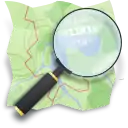Iyo, Ehime
Iyo (Japanese: 伊予市, Hepburn: Iyo-shi) is a city located in Ehime Prefecture, Japan.
Iyo
伊予市 | |||||||||||
|---|---|---|---|---|---|---|---|---|---|---|---|
 Iyo City Hall | |||||||||||
 Flag  Seal | |||||||||||
 Location of Iyo in Ehime Prefecture | |||||||||||
 Iyo Location in Japan | |||||||||||
| Coordinates: 33°45′N 132°42′E | |||||||||||
| Country | Japan | ||||||||||
| Region | Shikoku | ||||||||||
| Prefecture | Ehime Prefecture | ||||||||||
| Government | |||||||||||
| • Mayor | Kuninori Takechi | ||||||||||
| Area | |||||||||||
| • Total | 194.44 km2 (75.07 sq mi) | ||||||||||
| Population (August 1, 2016) | |||||||||||
| • Total | 37,982 | ||||||||||
| • Density | 195.93/km2 (507.5/sq mi) | ||||||||||
| Time zone | UTC+09:00 (JST) | ||||||||||
| City hall address | 820 Kominato, Iyo-shi, Ehime-ken 799-3193 | ||||||||||
| Website | www | ||||||||||
| |||||||||||
On August 1, 2016, the city has an estimated population of 37,982 and a population density of 195.93 persons per km². The total area is 194.44 km².
On April 1, 2005, Iyo absorbed the towns of Nakayama and Futami (both from Iyo District) to create the new and expanded city of Iyo, raising its population to over 40,000 and nearly quadrupling its area.
The seal of the city of Iyo incorporates the red of the sunset of Futami, the green of Nakayama, and the blue of the original Iyo city seal.
Geography
Iyo is situated in the center of Ehime, approximately 10 kilometers southwest of the prefectural capital of Matsuyama. The western portion of the city, from Gunchū in the north down to Futami's Shimonada in the south, hug the coast of the Inland Sea, nestled in the southwestern section of the Dogo Plain. The southeastern portion of the city enters into the mountains in the interior of the prefecture, and the Nakayama area in particular is quite mountainous.
History
While archaeological artifacts show that the Iyo area has been settled since at least as far back as the Yayoi period (300 BC to 250 AD), the origins of the present city of Iyo can be traced back to the year 1635, when the Matsuyama han ceded the territory including Iyo to the Ōzu han. The port at Gunchū, the heart of present-day Iyo, became the main commercial port for the Ōzu han and the surrounding community flourished.
On January 1, 1955, the town of Gunchū was merged with the villages of Kita-yamasaki, Minami-yamasaki and Minami-iyo to create the first incarnation of the city of Iyo.
On April 1, 2005, Iyo absorbed the towns of Nakayama and Futami (both from Iyo District) to create the new and expanded city of Iyo.
Economy
Iyo houses the national headquarters for Marutomo and Yamaki, food manufacturing companies that specialize in dried Bonito flakes. Other main products include mikan and Nakayama chestnuts and other fruits and vegetables. In addition, Futami has had some success in making its sunset a local tourist draw, creating a seaside park, a sunset museum and an annual sunset concert at its Shimonada Station.
Transportation

Rail
Iyo is served by the Yosan and Uchiko lines of JR Shikoku and the Gunchū line of the Matsuyama commuter railway system run by the Iyo Railway Company.
The Yosan Line follows the coastline, running from Torinoki Station in the north through Iyoshi Station, the main station serving pre-merger Iyo, Mukaibara Station, then Konokawa Station, Iyo-Kaminada Station, Shimonada Station and Kushi Station in Futami before running into Ōzu. Nakayama is served by the Uchiko line, which diverges from the Yosan Line at Mukaibara and continues on Iyo-Ohira Station and Iyo-Nakayama Station before entering Uchiko and eventually rejoining the Yosan Line in Ōzu. Limited express trains stop regularly at Iyoshi Station and occasionally at Iyo-Nakayama Station.
The stations on Iyo Railway Company's Gunchū line within the city of Iyo are Shinkawa Station, Gunchū Station and the terminal station, Gunchūkõ, which is directly across the street from Iyoshi Station on JR Shikoku's Yosan Line.
Road
The Matsuyama Expressway's Iyo exit provides access to the Matsuyama International Airport and runs through the center of the city, as does Route 56 linking Matsuyama to Ōzu. Route 378, running from downtown Iyo through Futami and towards Nagahama, is a scenic coastal road.
Notable individuals from Iyo
External links
| Wikimedia Commons has media related to Iyo, Ehime. |
- Official website (in Japanese)
 Geographic data related to Iyo, Ehime at OpenStreetMap
Geographic data related to Iyo, Ehime at OpenStreetMap